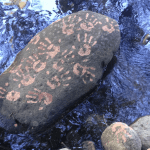 Heathens generally own their own actions proudly, and they realize that comes with a large dose of accountability and mindful thought about how we spend our energy. Agendas belonging to others do not dictate our values and ethics, nor does formalized doctrine absolve us from having ethics or excuse us when we act with dishonor.
Heathens generally own their own actions proudly, and they realize that comes with a large dose of accountability and mindful thought about how we spend our energy. Agendas belonging to others do not dictate our values and ethics, nor does formalized doctrine absolve us from having ethics or excuse us when we act with dishonor.
However, heathen groups attempting to take a stand on a controversial issue sometimes take a downward turn. Initially, most people will support such a stand if its pretense is to rid the community of something dishonorable. Then slowly, those initial intentions become blurred and the purpose is lost, due to an underlying hidden agenda. When a group leans heavily into a particular side of politics, and those politics are pushed into the faith, emotions tend to rule the ensuing discussions. Radicalism on every side of the political spectrum exists in all faiths, but embracing radical politics is rarely an effective means of positive community building.
Heathens have historical precedents on this issue. Snorri himself had more than eight chieftaincies in his lifetime and made a living at community building. His fatal flaw, however, was having a huge ego and serving his own agenda rather than attending to the best interests of his community. Those actions turned many of his own supporters against him, and he eventually was murdered in his own home. His political stances were controversial, but his personal agendas swallowed him.
The heart of a warrior does not lie in inciting conflict but rather in determining when, and at what point, a necessary action needs to be taken–not to divide, but to restore the basic principles of honor and stability. That is the difference between working for a cause in logical way versus responding to one based on pure emotion. Odin was a war chieftain, a role that many heathens both admire and respect. This would have required him to consider his responsibilities to those he was charged with overseeing. As heathens who aim to walk in the footsteps left by the gods, our own endeavors become ones that need to reflect our values and character. What we stand for, condone, and create becomes part of our wyrd, and we accept full accountability for the success or consequence.
However, it has become commonplace for some groups to use the heathen platform in order to serve an agenda. The real problem with this is that it only serves to divide an already small community of individuals, rather than finding and cultivating a common ground that builds the heathen community. Rarely are self-serving groups seen providing any sort of education or advocating the restoration of heathen values that were inherent to our ancestors. In fact, these particular groups hardly explore anything that relates to heathenry outside of how it may apply to their cause. They proudly wave the heathen flag to solicit support and end up doing nothing that does anything remotely constructive. Instead, they tend to be extremely vocal yet accomplishing little.
The reason for this is usually that heathens as a whole do not wish to further separate themselves from each other in order to cater to someone else’s agenda, be it political or personal. We are highly individualistic in our faith, and when we commit ourselves to a cause or group, we do not want it to be something that only services the ego of a few misguided individuals. Heathens are generally very proud of their willingness to own up to their actions and form their decisions accordingly. The causes we choose to support are usually ones that we feel will reflect heathen values and build honor. Where such causes derail is when the group(s) endorsing said cause are actually just hungry for attention and exposure and happy to create disputes with other heathens and the larger community with little if any real resolution. Simply stated, people don’t like wasting their time and energy serving someone else’s goals, especially goals based on mere perception, broadly-based accusations, or personal trifles.
Why not devote the same energy into bridging gaps through logic and education, which helps recognize and restore commonality and shared goals and builds the heathen network of individuals? Heathens are still a growing group trying to reclaim our customs, traditions, and faith. Agendas that aim to divide us do us no good. Historically speaking, chieftains often worked very hard to ensure that the people they were responsible for were conducting themselves in a way that was beneficial to self, home, family and larger community. Without this type of unification, small tribes would have lived in a state of disarray and unpreparedness. There was a prescribed way of resolving conflicts at the Thing. In other words, there was a logical time and place for airing grievances and settling disputes. The rest of the time was spent tending to family and community welfare. They focused on commonality, not division.
As strong individuals, we are fully capable of championing our own causes, ones that we feel coordinate with our values and build honor. Our ability to determine those values is not dependent on someone else’s effort to stake a claim on a particular platform. The quickest way to tell whether the leadership of a particular cause is legitimate or agenda-driven is to investigate the leader’s past actions within the community, ask questions of their peers, and look at where they personally stand on other issues. Does the group tend to cause deliberate divides amongst heathens? Are they known for their good character? Do their actions reflect your values? When coupled with logical planning, dialogue, and active commitment, a group that unifies rather than divides keeps the integrity of how our ancestors lived within tribal communities – as well as providing a reasonable approach to bridging gaps.













